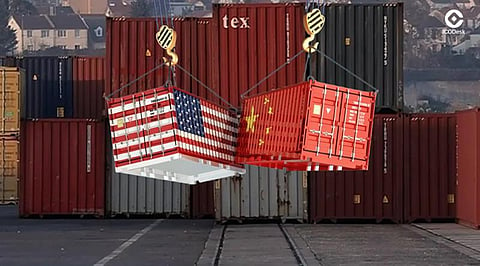

A top Chinese diplomat has harshly denounced Washington's imposition of deep tariffs on Indian imports as "unfair" and "unreasonable," warning that it would jeopardize the stability of global trade.
The comments followed a new tariff announcement by the United States, imposing up to 50% duties on a broad array of Indian products, ranging from steel and textiles to consumer electronics. American officials have contended that he tariffs are needed to shield domestic industries and diminish over-reliance on foreign manufacturing.
Addressing a forum in New Delhi on Monday, China's ambassador to India, Liu Jinsong,
asserted that the US has long enjoyed the fruits of open and free trade but is now turning towards "protectionism that erodes the very system it initially defended."
He further stated that unilateral increases in tariffs not only aim at developing economies such as India but also have the potential of breaking up global supply chains.
The United States benefited for decades under free trade and globalization. Now, when other countries rise through the same system, Washington picks protectionism and retaliatory tariffs," Liu said. "This is unreasonable, unfair, and ultimately bad for everyone.
The envoy's remarks are a manifestation of Beijing's wider resistance to American trade policies that have also encompassed blanket tariffs on Chinese products since 2018. By accusing Washington of its latest action against India, China is playing the role of defender of open markets and closer convergence with New Delhi on trade matters.
India, for its part, has indicated strong dissatisfaction with the US move. Ministry of Commerce officials stated that the tariffs could harm exporters and hinder economic growth. New Delhi is reportedly considering retaliation, although it has not yet disclosed details.
Analysts believe the fresh tariff conflict may complicate Washington-New Delhi relations at a moment when the two nations are strengthening their strategic and defense ties to counterbalance China's influence in the Indo-Pacific.
"It is a fine balancing act for India," said policy analyst Devendra Sharma. "Although it cherishes its alliance with the US, retaliatory trade actions will put the relationship to the test."
As tensions simmer, firms on both sides are preparing for possible disruptions. Economists caution that sustained trade tensions would stall investment flows and inject inflationary pressure worldwide.
In the meantime, China's public stand in support of India underlines a changed dynamic in trade diplomacy - one in which Washington's old allies and adversaries alike are increasingly resisting its tariff approach.